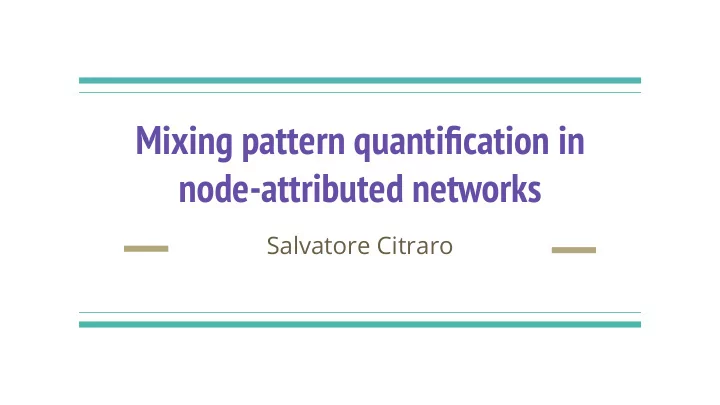

Mixing pattern quantification in node-attributed networks Salvatore Citraro
A brief context (of my work) Feature-rich networks ( Interdonato et al. 2019) More information as a complement to the topology e.g. node-attributed networks Improve solutions to complex network tasks Community detection : EVA [1] Network measures: Conformity [1] Citraro S., Rossetti G. (2020) “Eva: Attribute-Aware Network Segmentation”. COMPLEX NETWORKS 2019
Node-attributed networks What can we do? Community detection well-connectedness and homogeneity Network measures quantify homophily according to the attributes carried by the nodes
Homophily Tendency of similar nodes to interact with similar others social networks : education, age, gender, work, etc. co-citation networks : topics linguistic networks : psycholinguistic variables of words Idea 1: Idea 2: nodes with similar characteristics (degree, labels) are similar characteristics are more prominent along connected with a higher probability than expected short distances
A special case: degree Newman’s assortativity [2] Clumpiness [3] [3] Estrada, N. Hatano, A. Gutierrez, “Clumpiness mixing in complex networks”, [2] Newman, M. E. J. “Mixing Patterns in Networks.” Physical Review E Journal of Statistical Mechanics: Theory and Experiment. 67.2 (2003): n. pag. Crossref. Web.
Newman’s assortativity (categorical) A global measure based on Pearson’s r r = -1 perfectly disassortative r = 0 no assortative (or random) mixing r = 1 perfectly assortative r = 0.621 Limitation An average quantification of mixing pattern across the whole network ● Different patterns and outliers are not identified ●
Peel’s assortativity [4] A node-centric measure based on a multiscale strategy overcome limits of global assortativity [4] L. Peel, J.-C. Delvenne, R. Lambiotte, “Multiscale mixing patterns in networks”, Proceedings of the National Academy of Sciences. Detailed explanation of the measure: https://piratepeel.github.io/slides/MixingPatterns_IC2S2.pdf
Conformity (Rossetti G., Citraro S., Milli L.)
Conformity (cont’d)
Case studies Facebook100 : gender, year, dorm, etc... just an overview of Conformity Interaction data from Copenhagen Network Study : gender a statistically significant comparison of Conformity and Peel’s assortativity
Facebook100 - Gender
Facebook100 - Year
Dorm (Simmons)
Interaction data from Copenhagen Network Study Homophily by gender : the most difficult to capture (under-representation of women, etc) In the absence of a ground truth we can not say whether Conformity or Peel’s assortativity approximate the network behaviour
Framework of comparison Community structure as a matter of comparison the minority group within a community must be more heterophilic than the majority group Hypothesis the more gender groups are unbalanced within a community, the more the minority group is heterophilic w.r.t. gender
Peel’s quintet
Peel’s quintet (unbalanced) (e)
First step: find the core A meta-definition of community is not enough the comparison must be done with nodes strongly embedded within their communities (statistically significant) degree embeddedness
CNS - Monday (Walktrap)
Second step: analysis of variance Hard due to group size unbalance itself two-way ANOVA? An idea: Mann-Whitney U
Why? Peel’s assortativity Conformity Maybe Peel’s assortativity can not scale in extremely unbalanced situations
Conclusion and future works 1. Conformity is more coherent than Peel’s assortativity w.r.t. the community structure of networks (must be proven better in future) 2. Conformity is quite expensive 3. Is Conformity a metrics ?
Recommend
More recommend